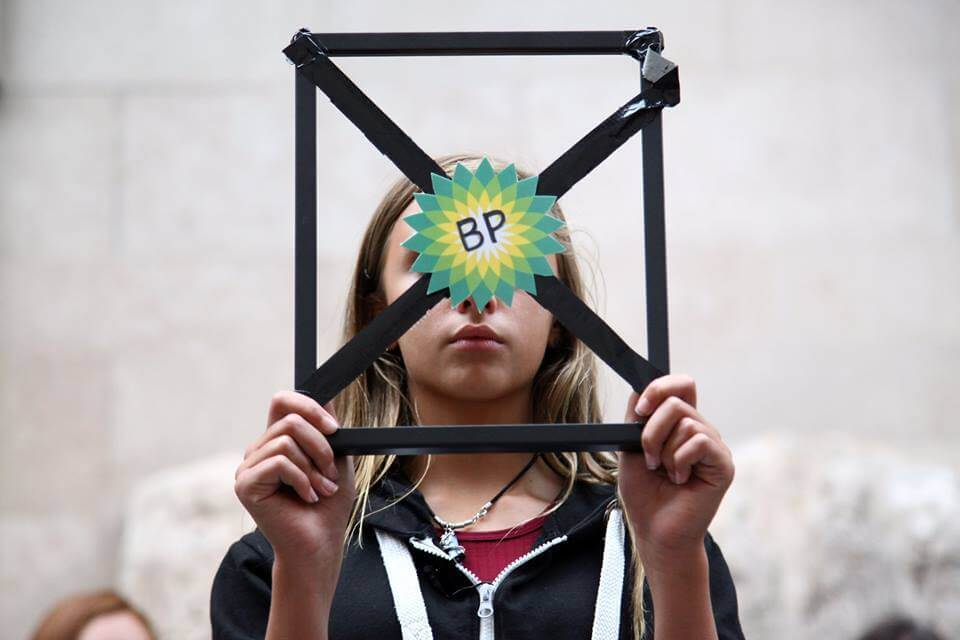
This is a guest blog by Victoria, mother of Laurel, 13, from Children Against Global Warming.
Last Sunday my daughter was one of three children who performed an intervention at the British Museum and the National Portrait Gallery as part of a day of protests organised by Art Not Oil, against BPs sponsorship. Laurel is 13. It’s not the first time she has done something like this. Earlier this year she spoke to an audience of 20,000 people at the Time to Act climate march.
It has been a little frightening to allow her to do these things, but she has strong feelings about the world she is growing up in, and I have to agree that we need to hear voices like hers. It is hard to accept that a child so young has learnt that the grown-ups in charge cannot be trusted with the future, but the very least I could do was allow her the opportunity to say it loud and clear. I am sad there is a need for actions like hers, but am also in awe of her for doing this at her age and impressed by the power that her presence has. The first time she spoke the crowd roared and I couldn’t stop crying.
Perhaps she shouldn’t know about climate change. But my daughter lives in a family where politics is discussed and issues are debated. Our close friends talk to her and respect her enough to listen to her opinion. Like all kids, she spends time on the internet and watching TV and in amongst the vlogs and teen shows, she watches documentaries and browses for facts. She has a particular love of the natural world and can tell you how to distinguish a pilot whale from a bottle-nosed dolphin. She would find it very odd if you told her she shouldn’t know about things. Sometimes she is frightened – she said it in that piece on Sunday – but she is also angry. She is not some dumb, innocent creature; she is a passionate, thoughtful person. I can’t protect her from knowing about the world. But I can let her say what she thinks.
Since Sunday some people have tweeted that the kids were ‘used’ or manipulated. Good luck to anyone who tries manipulating Laurel! She is a shrewd judge of character and takes no prisoners. She is close to her black belt in karate.
Of course it would be unrealistic to suggest she could do these public actions without adult support. Her dad suggested they make a video together for children and schools about the dangers of global warming. They also began a petition together (which needs more signatures!) to take to the Paris summit. This became Children Against Global Warming. It was because of the video Laurel was invited to speak at the march, and following that, invited to get involved in creating a performance for Art Not Oil’s day of action.
The performance was a collaboration between CAGW and some adult activists from the Dharma Action Network for Climate Engagement, a group of meditators and mindfulness practitioners keen to offer a space for voices often overlooked to be heard in the sphere of social change. One of the members of DANCE is also an associate of the National Youth Theatre and they all spent a day together playing games and discussing what the children felt about the issue of climate change and about the future. The kids distilled the material they generated into a piece of spoken word. The question of how much the adults should do to give shape and clarity to a performance made by young people is always difficult, but they were very careful to keep the kids’ ideas and words central and stepped back to give them autonomy. On the day, the adult’s main responsibility was to hold the space and to manage security.
The danger fossil fuels pose to global temperatures and the more specific issue of BP’s charge of gross negligence and record on environmental damage is well documented. I was part of the subsidised arts myself for many years, so I know that it is not easy to ask an institution to give up hard-won sponsorship. But I also know that commercial sponsorship is a form of marketing for the sponsor. Children use the British Museum. The Egyptian halls are a staple of our childhoods. Should BP be endorsed by such a main-stay of education? Especially when they only contribute 0.8% to the British Museum’s annual budget? Is it not appropriate for the children to say what they think of that? BP currently have their logos all over an exhibition at the National Portrait Gallery entitled ‘The Next Generation’. Is the next generation not entitled to comment on what they think about BP’s impact on their future?
I am very proud of my daughter: that she should want to do this and that she should have enough understanding and enough confidence. I am grateful to the adults who give her the opportunity to be part of the fight for change at this pivotal time.